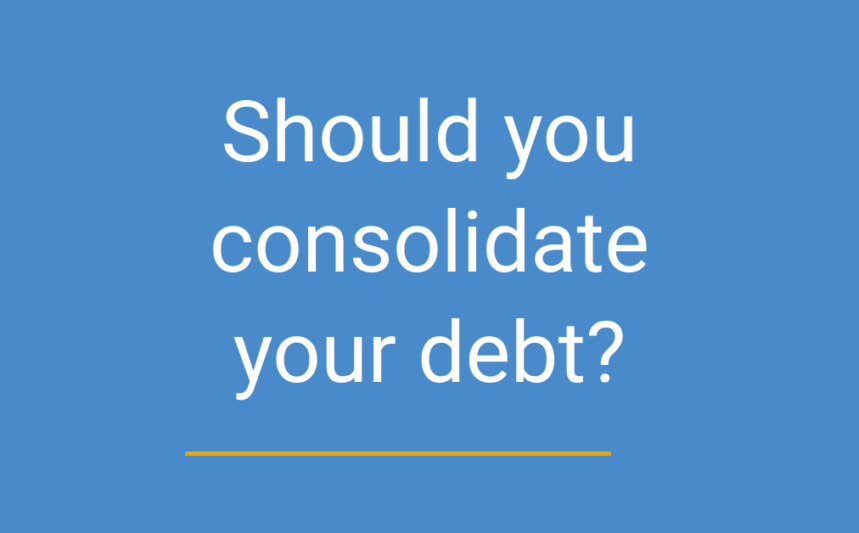If you have any outstanding loans, credit card payments, or other forms of debt, you’re not alone. According to America’s Debt Help Organization, household debt in the United States hit $14.6 trillion in the spring of 2021, a record debt load shared by about 340 million people.
One way to potentially reduce your debt burden is through debt consolidation. When you consolidate debt, you combine multiple bills with varying interest rates, payment amounts, and due dates into a single payment. However, debt consolidation isn’t always the best option.
You may be wondering, “Is debt consolidation a good idea for my specific situation?” Use this Liberty Bay guide to debt consolidation to help you decide.
When is debt consolidation a good idea?
It may be beneficial to consolidate your debt if you are in the following situations:
- Your credit is healthy enough to lower your interest rate.
Do you have good or excellent credit, or has your credit improved? You may be able to lower your overall interest rate through debt consolidation. This method will help you reduce your total debt and potentially even pay it off faster. - You want to streamline multiple debts.
Debt consolidation can help streamline your finances. Having multiple debts can be challenging to track and organize. Consolidating them into a single loan or credit card reduces your chances of missing payments and gives you a clear end date as a goal for when you will finish paying off all your debt. - Your monthly payments are not excessive, but you want to make them smaller.
One common debt consolidation mistake is applying for an extended loan term that reduces your monthly payments but increases your overall payments. With the right balance, consolidating your debt can help lower your payments while avoiding increasing the life of the loan so much that you’ll end up paying more over time.
Need more guidance? Use the Liberty Bay debt calculator to see how soon you can eliminate your debts to make a more informed decision.
Are there any reasons not to consolidate debt?
Sometimes, debt consolidation isn’t worth the hassle. Consider if the following situations sound similar to what you’re facing:
- Your debt load is relatively negligible.
If you only have a handful of debts or a manageable total debt size, consolidating your debt might be more complicated than tackling your debt load on your own. Consider these strategies instead:- Snowball method: if you have many small debts with similar interest rates, start with the smallest debt and eliminate them one by one.
- Avalanche method: continue making all your monthly minimum payments while focusing on eliminating your largest or highest-interest debt first.
- You need to focus on practicing healthy financial habits.
Consolidating your debt doesn’t fix financial issues like overspending or not budgeting correctly. In addition, if you don’t have healthy financial habits, chances are your credit score won’t be high enough to qualify for the low interest rates you need for strategic debt consolidation. It may be worthwhile to start by building financial capability - Your debt load is overwhelming.
Your total debt load should not be more than half of your gross income. If you have too much debt to handle even if you start taking extreme budget-cutting measures, you may want to consider seeking debt relief programs such as bankruptcy or negotiating with creditors instead.
Still not sure whether or not to pursue debt consolidation? Use the Liberty Bay debt consolidation calculator to help as you consider your options.
How to consolidate your debt
If you decide that debt consolidation is a good idea for your situation, the next question to consider is how you will consolidate your debt. There are two main methods of consolidating debt:
- Credit card: transfer all your debts onto a credit card with low introductory rates and pay the balance in full during the promotional period.
- Look for a card with a 0% interest period of at least 15 months and a $0 annual fee. Some cards even charge a $0 balance transfer fee.
- You will most likely need good or excellent credit to qualify for this financial product.
- Loan: use a personal loan, home equity loan, or another form of a debt consolidation loan to pay off your debt in full. Then, pay back the loan over its life or faster.
- Typically, the higher your credit score, the more likely you’ll qualify for the lowest loan rates. However, you can still qualify for a loan with bad or fair credit.
- Fixed-rate loans may come with higher interest rates, but it can be harder to plan for variable-rate loan payments.
The best debt consolidation method depends on your credit score, debt-to-income ratio, personal circumstances, and much more. Each method comes with its own pros, cons, and risks, which you should consider carefully before making your decision.
If you have healthy credit and sound financial habits, debt consolidation can help you manage your debt more efficiently. Talk to a financial expert at Liberty Bay to discuss your debt management options and decide if debt consolidation is a good idea for you.


